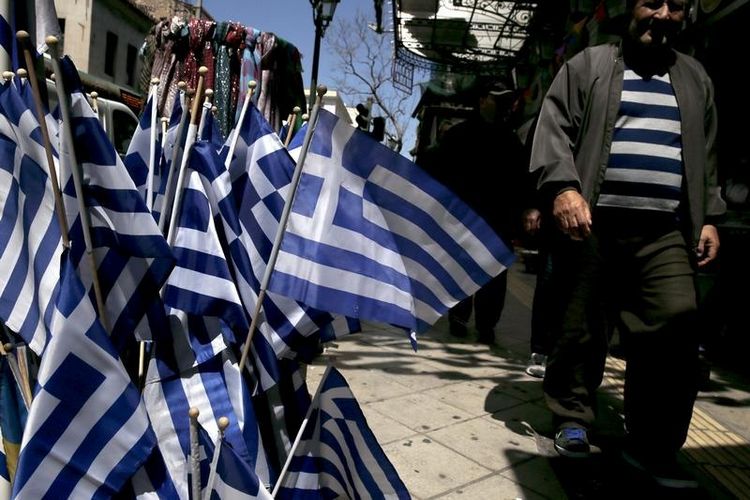It was a busy weekend around Europe as the very, very, very, very last warning to Greece replaces the very, very, very last one, all of which are rendered a complete nonsense by the consistently repeated assurances by the powers that be that they will under no circumstances let it drop out of the eurozone.
It’s no longer a matter of whether the jokers in Athens can or cannot be taken seriously but how seriously they themselves feel they need to take the others.
The deadline of April 24th seems to mean nothing now and it will come and go as we search for a new dead-line which will not be met. All the while, Athens continues to play off Moscow, Beijing and Brussels against each other Yanis Varoufakis take the biscuit for cheek with his warning that a Grexit would cause untold chaos across the eurozone while pointing at the risk of contagion. This is now plain and simple blackmail but I guess that the eurozone has painted itself into such a tight corner that it will struggle to get out of again without causing huge damage to itself and its reputation. Check and query! It already has done and irrespective of what happens with Greece over the next four weeks, months or years, the euro is damaged goods.
Bunds at 0.07% yield and a euro at US$1.08 don’t exactly tell a story of trust and confidence. The FT has even added a little column called “Wunderbund” which it has established to track what it sees as the inevitable journey to zero interest rate 10-year bond.
Meanwhile, there are some other things happening in the rest of the world, not least of all a pretty fierce risk sell-off in New York on Friday. In the US, March Year-over-Year CPI dropped into negative territory at -0.1% but at +0.2%, Month-over-Month inflation, though a tad below the forecast rate of 0.3%, still points to a gradual pick-up which will surely give the Fed’s hawks something to hang their hats on. That, combined with some fairly pedestrian quarterlies from corporate America spooked equities which have been on happy powder for far too long. The Dow hitting 17,748 points in mid-session really scared some people and had it closed there, we might have been in for a mini-crash this week. In the event, it rallied back to close at 17,826 points which let it escape with a 1.5%-down day which, in the greater scheme of things, is neither here nor there.
Chinese easing, again
Overnight, the Chinese authorities in the form of the PBOC have reverted to type and again lowered the reserve requirement ratio. The cut by 1% to 18.5% is decent but as the bank is quick to point out, it still has plenty of room for more. From here it looks like a case of a drug addict trying to make you feel better by reassuring you that he is still only injecting low-purity junk and that therefore the risk of him killing himself on an overdose is quite manageable.
Does the fact that Beijing knowing that it can re-inflate its credit bubble at will make it any less of a bubble? Can nobody remember what happened when Alan Greenspan was the hero for either easing or looking as though he was just about to ease every time it looked as though US consumption was slowing? The lowering of the reserve requirement is estimated to give the banks a further 1.2 trillion Yuan to play with, which is the better part of US$200 billion.
Whatever it does do, the Hang Seng was mightily unimpressed and is, at the time of writing, down by well over 2% and the key mainland indices are also deeply in the red. Could this all be part of that major retracement of stock prices which is so widely talked of? I think not. With bonds still yielding next to nothing – anyone who thinks of a 1.84% 10-year Treasury note as attractive is either very young or very stupid – and with commodities also in no-man’s land (US$56.00 pbb WTI is in the same league as the 1.84% 10-year) equities will remain the default asset of choice. That the amplitudes of the ups and downs may have increased, has most probably more to do with itchy trigger fingers than with anything fundamental which, if one looks under the rock, wasn’t there in force to start with.
Back to the politics…
The UK election bandwagon rolls on and my sense that a grand coalition might not be the most stupid of outcomes increases day by day as I listen to some of the rubbish being spouted by minority and nationalist parties, Braveheart poster-girl Nicola Sturgeon included.
While the British are busily navel gazing, the Finns have dismissed their government and have elected a new Centre Party majority under Juha Sipila – if 49 out of 200 seats can be called a majority – on the basis that if what you had wasn’t working, why not try something new. What wasn’t working was an administration which marched step for step with Berlin and which, in the eyes of the Finnish voters, apparently put EU solidarity ahead of parochial Finnish interests. Finland might be a small country but, pardon the comparison, Greece has proven that small doesn’t mean irrelevant. From being best friend, it might transmute into a very uncomfortable little agitator. Let us not forget that for Finland, Russia is more than just a good market. It is a vital market.
